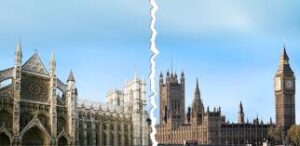Church and State
Early in November, in many places, civic and church leaders met together for Remembrance Sunday. The Church of England is part of our state; we recognise the Queen as the head of the church. This Sunday, the 22nd, the Church remembers a different type of authority; we mark the Festival of Christ the King. How do we balance the claims of Christ and the state on our lives?
At the very start of the Second World War, Bishop George Bell pondered this question. Bell is now a very controversial figure due to allegations of child abuse. But regardless of these, his words still challenge me on what the church is for and how it sits alongside the state.
“The State has a function, and the Church has a function. They are distinct. The State is the guarantor of order, justice and civil liberty. It acts by the power of restraint, legal and physical. The Church, on the other hand, is charged with a gospel of God’s redeeming love. It witnesses to a Revelation in history. It speaks of the realities which outlast change. It aims at creating a community founded on love, So when all the resources of the State are concentrated, for example, on winning a war, the Church is not a part of those resources. It stands for something different from these. It possesses an authority independent of the State. It is bound, because of that authority, to proclaim the realities which outlast change. It has to preach the gospel of redemption. [In short, the Church] is not the State’s spiritual auxiliary with exactly the same ends as the State. To give the impression that it is, is both to do a profound disservice to the nation and to betray its own principles…”
